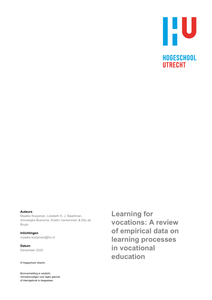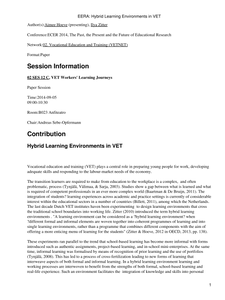The focus of the thesis is an exploration into students’ vocational knowledge in the context of Dutch vocational education and training (VET). The reason students’ vocational knowledge requires exploration is because there is no consensus among scholars in the field of VET about how to theorise the nature of students’ vocational knowledge; most (not all) scholars rely on dichotomous conceptualisations, such as theory versus practice, general versus specific or explicit versus implicit. However, such commonly used dichotomies are not very helpful to understand the complex nature of vocational knowledge. Vocational knowledge is more than putting bits of theoretical and practical knowledge together, it is characterised by sometimes-intimate relationships between knowledge and actions. As a result of the above-mentioned gap in the VET literature, there is little empirical research on how VET students develop vocational knowledge and the extent to which this is occupation-specific knowledge. To understand students’ vocational knowledge, four different aims are formulated and carried out in four studies. The aim of the first study is to identify powerful vocational learning environments to enable the selection of a case that represents high quality vocational learning and teaching. With an eye on analysing students’ vocational knowledge, the second study aims to conceptualise the nature of vocational knowledge that avoids dichotomies. Therefore, two conceptual frameworks are integrated; the idea of contextualising is introduced which is based on cultural-historical theory to highlight the crucial role activity plays in knowledge development and to understand the relationships between the mind (i.e., what people think (and feel)), and action (i.e., what people do). Secondly, the theory is supplemented with ideas from inferentialism, a philosophical semantic theory of meaning to provide a useful way to focus on students’ processes of knowing and to reveal students’ vocational knowledge in terms of ongoing reasoning processes. The third study uses the conceptualisation of vocational knowledge to explore how students develop vocational knowledge in occupational practice, and to illustrate the process of contextualising. The forth study aims to describe what characterises students’ vocational knowledge using an analytic framework that distinguishes between occupation-specific knowledge components and qualities. This thesis contributes to research scholarship in the field of VET and an understanding of students’ vocational knowledge in practice. The theoretical framework of contextualising supplemented with inferentialism provides an alternative way to focus on students’ processes of knowing and helps to reveal students’ vocational knowledge in terms of reasoning processes. The empirical explorations and illustrations of students’ vocational knowledge contribute to the scholarly literature and practice on understanding the nature of vocational knowledge, how students develop vocational knowledge and what characterises their vocational knowledge. The intention to introduce the idea of contextualising is not about reinventing the wheel but rather an attempt to understand how it turns and how it functions. The intention of this thesis is to encourage dialogue and move the debate about the nature of vocational knowledge further, and hence, to provide some “food for thought”.
DOCUMENT

Numeracy and mathematics education in vocational education is under pressure to keep up with the rapid changes in the workplace due to developments in workplace mathematics and the ubiquitous availability of technological tools. Vocational education is a large stream in education for 12- to 20-years-olds in the Netherlands and the numeracy and mathematics curriculum is on the brink of a reform. To assess what is known from research on numeracy in vocational education, we are in the process of conducting a systematic review of the international scientific literature of the past five years to get an overview of the recent developments and to answer research questions on the developments in vocational educational practices. The work is still in progress. We will present preliminary and global results. We see vocational education from the perspective of (young) adults learning mathematics.
LINK
Educational policies in the Netherlands reveal that the current mainstream participatory approach to citizenship education jeopardises students’ autonomy. Especially in Dutch post-secondary vocational education, citizenship education has been shown to be mainly aimed at socialization: initiating students into tradition, internalising rules, societal norms and values. This article reports on the findings of a research project, which is grounded in the assumption that integrating Bildung, citizenship education and critical thinking is a promising way to grapple with the perceived overemphasis on socialization strategies. We justify the interrelationship of critical thinking, Bildung, citizenship education, and professional training from two perspectives – historical and contemporary. It is only by combining these concepts, we contend, that educational professionals can create teaching materials more geared to developing autonomy, and prepare students in vocational training to navigate the political and societal dilemma’s on the work floor. Furthermore, we also clarify our perspective by offering three educational principles, used in our project to guide the design of teaching materials, that form a context for integrating citizenship, critical thinking, and Bildung in vocational education. A practical illustration is subsequently discussed.
DOCUMENT

This article reports on a literature review on empirical research investigating learning for vocations in the context of vocational education. We included 36 studies in which learning for vocations is empirically studied. Learning for vocations is characterised based upon prevalent research traditions in the field and framed from the perspective of vocational education and organised learning practices. This framing and characterisation directed the search terms for the review. Results show empirical data on vocational learning and illustrate how learning processes for the functions of vocational education - vocational identity development, development of a vocational repertoire of actions, and vocational knowledge development - actually take place. The review further shows that, empirical illustrations of learning processes that occur in the context of vocational education and organised learning practices are relatively scarce. The findings can be typified in relation to our theoretical framework in terms of three learning processes, that is learning as a process of (a) belonging, becoming, and being, (b) recontextualization, and (c) negotiation of meaning and sense-making. We argue that more empirical research should be carried out, using the functions of vocational education and the three learning processes to better understand vocational learning.
DOCUMENT

This study provides insight into Vocational Education & Training (VET) students’ plurilingual repertoires, their behaviours during and attitudes towards interactions in daily life, school and work. A multi-modal approach comprising language mapping, reflective discussions and focus group (FG) interviews with VET students in the Netherlands (N = 38) shows that both heritage- and majority-language students possess rich plurilingual repertoires which are used in distinctly different ways in daily life and at work, but not at school. Students generally possess an open attitude towards plurilingualism, which is tempered by perceived limitations in language proficiency and language retrieval difficulties. The study shows that students’ existing plurilingual competences, and issues encountered when employing these, are currently neither recognised nor addressed in the school context. Implications for education are formulated.
DOCUMENT
Vocational education and training (VET) plays a central role in preparing young people for work, developing adequate skills and responding to the labour-market needs of the economy. The transition learners are required to make from education to the workplace is a complex, and often problematic, process (Tynjälä, Välimaa, & Sarja, 2003). Studies show a gap between what is learned and what is required of competent professionals in an ever more complex world (Baartman & De Bruijn, 2011). The integration of students? learning experiences across academic and practice settings is currently of considerable interest within the educational sectors in a number of countries (Billett, 2011), among which the Netherlands. The last decade Dutch VET institutes haven been experimenting to design learning environments that cross the traditional school boundaries into working life. Zitter (2010) introduced the term hybrid learning environments . "A learning environment can be considered as a hybrid learning environment? When different formal and informal elements are woven together into coherent programmes of learning and into single learning environments, rather than a programme that combines different components with the aim of offering a more enticing menu of learning for the students" (Zitter & Hoeve, 2012 in OECD, 2013, pp. 138).
DOCUMENT

Symposiumbijdrage conferentie EARLI SIG 14, 11-14 september 2018, Genève Learning across the contexts of school and the workplace is highly relevant to the VET-sector. This contribution analyses these cross-contextual learning processes with three key issues in mind: (1) guidance by vocational educators, (2) assessment of students’ development and (3) design of VET-learning environments. Guidance, assessment and overarching VET-curriculum designs form the basis for constructive alignment as an approach to optimize conditions for high quality cross-contextual learning processes. We used the theoretical framework of boundary crossing to clarify the complex, multilevel nature of these key issues.
DOCUMENT

This article proposes a model for the design of a hybrid VET curriculum across the school-work boundary.
LINK
Against the background of increasing qualification needs there is a growing awareness of the challenge to widen participation in processes of skill formation and competence development. At the same time, the issue of permeability between vocational education and training (VET) and general education has turned out as a major focus of European education and training policies and certainly is a crucial principle underlying the European Qualifications Framework (EQF). In this context, «hybrid qualifications» (HQ) may be seen as an interesting approach to tackle these challenges as they serve «two masters», i.e. by producing skills for the labour market and enabling individuals to progress more or less directly to higher education. The specific focus of this book is placed on conditions, structures and processes which help to combine VET with qualifications leading into higher education.
DOCUMENT
The central aim of this thesis was to increase understanding of designing vocational learning environments at the school–work boundary. Four studies were conducted, focusing on learning environment designs at the school–work boundary and on design considerations of the actors involved in their construction, both from the world of school and the world of work.
DOCUMENT
